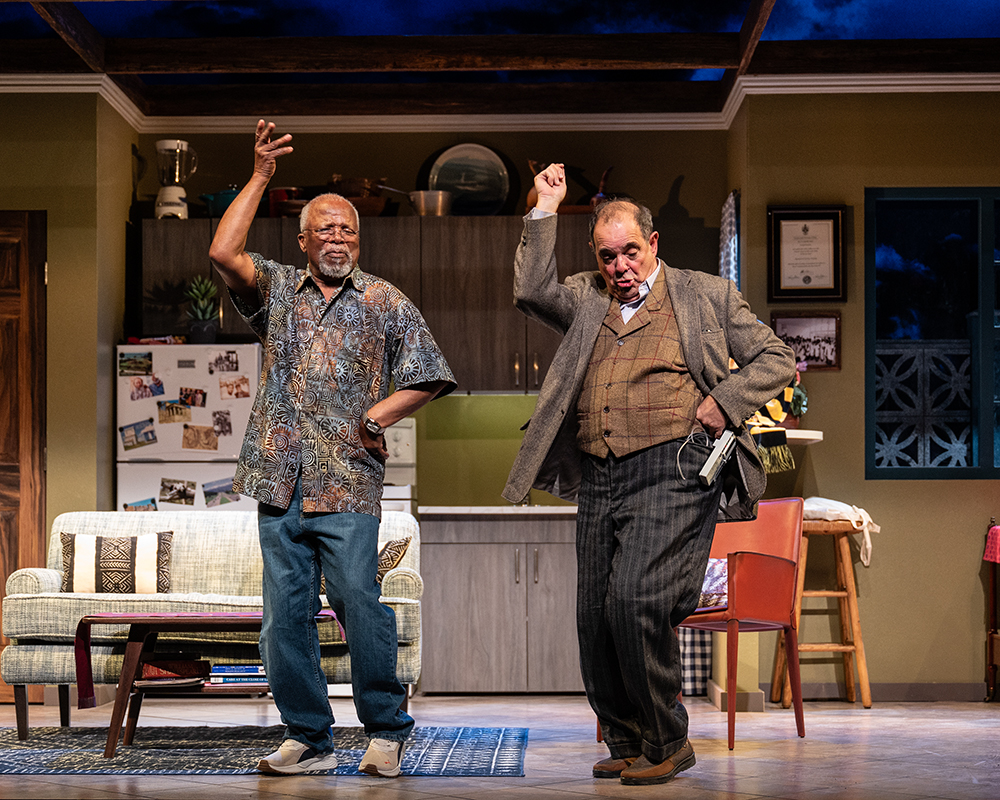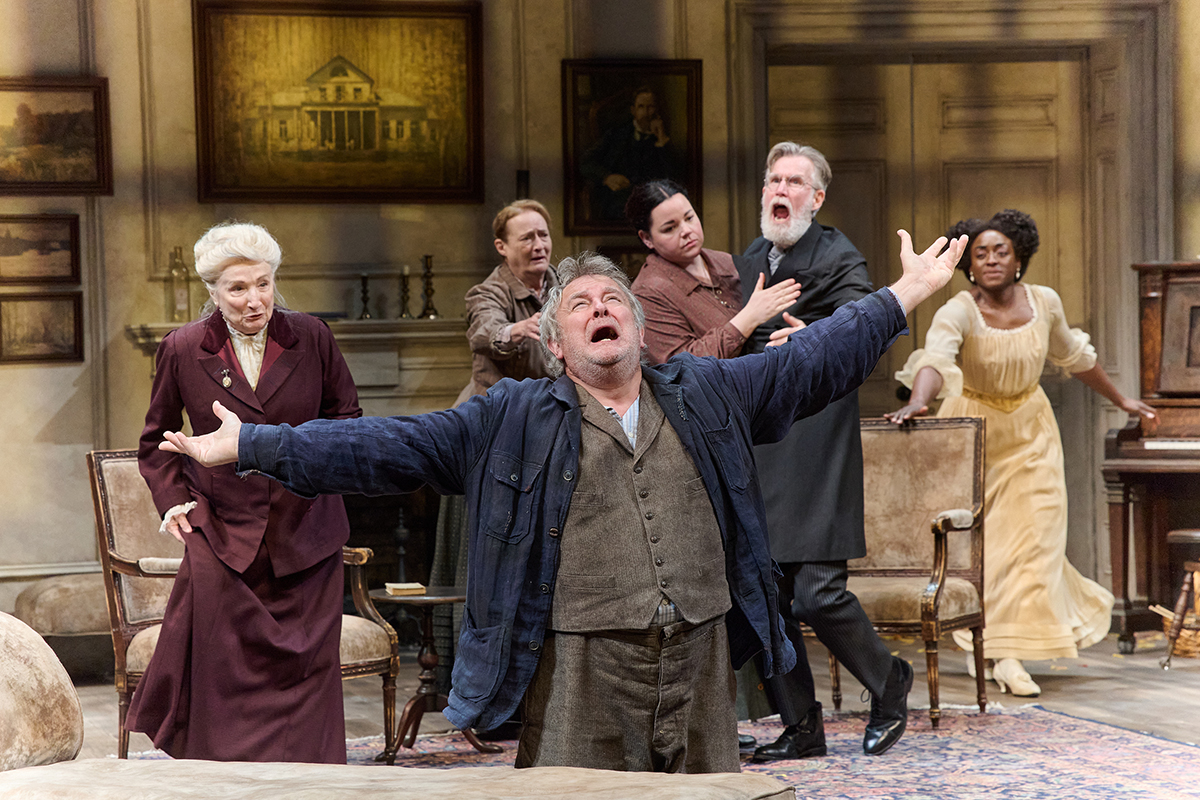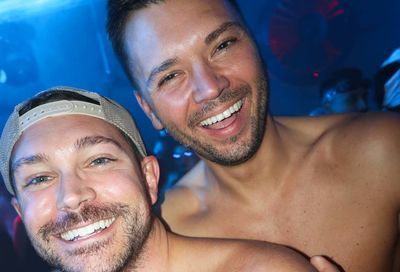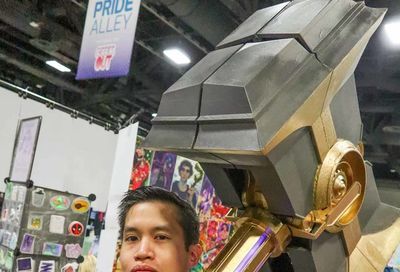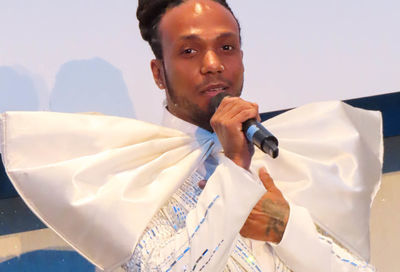Classical Figure
Interview with Shakespeare Theatre's Michael Kahn
Michael Kahn hates the legacy question. You can tell by the way he shifts in his office chair on this brisk Tuesday evening.
“I don’t ever think about that, ” he mutters.
Certainly, though, he must feel as though he’s made some kind of contribution to society? If nothing else by helping forge the nation’s preeminent vessel for classical theatre, The Shakespeare Theatre.
“I think I’ve made contributions to the understanding of Shakespeare in the United States. I think I’ve made contributions to helping artists grow. I think I made contributions to creating an institution that will last beyond me. I think I’ve made some contributions to the city to be a better theatre town. But I don’t consider that a legacy. ”
In 1986, Michael Kahn arrived in our city and began a slow but steady transformation of the way we watch Shakespeare — not just through the spectacular and often challenging seasons he mounted at The Shakespeare Theatre, but through his outreach attempts to bring Shakespeare to the masses, in the form of the wildly popular Shakespeare Free-For-All each summer at Carter Barron, a nod to Joseph Papp, the Public Theatre impresario who, in the mid-1960s, gave Kahn his first directing job.
Kahn’s mastery of Shakespeare is, at least in America, unrivaled. When Kahn interprets the bard, audiences leave with a clear and powerful understanding of the language, the themes, the subtexts within. But Kahn, who has won a record six Helen Hayes Awards for Outstanding Direction, has also served as a shepherd of sorts — providing opportunities for local actors and directors and putting them alongside star talent that frequently turns an evening at the theatre into a magical, soul-enriching experience not easily forgotten.
Tragedy struck Kahn last September when his partner of 24 years, Frank Donnelly, died suddenly. Donnelly, 74, had been volunteering for the Red Cross, counseling people who had lost loved ones in the World Trade Center collapse. Donnelly died in his sleep, the result, Kahn speculates, of simply being worn out from the stress of the experience.
Six months later, the pain of Kahn’s loss looms heavy. You can hear it in his voice, see it in his eyes. The familiar Michael Kahn sparkle is tinged with sorrow.
“My feelings about September 11, I don’t even know what they are yet, ” he says softly. “But there are thousands of people who are feeling like I do, who got up one morning and their life was different. ”
But Kahn is nothing if not pragmatic. Life goes on. There are plays to direct, a new season at The Shakespeare to produce, and responsibilities to the nation’s foremost arts school, Juilliard, where he currently serves as the Director of the Drama Division. And on Saturday, April 6th, Kahn will be expected at the Ronald Reagan Building, where he will receive the Shakespeare Theatre’s 15th Annual William Shakespeare Award for Classical Theatre, or “Will Award. ” A month later, on May 19th, he’ll be at a brunch at the National Education Association, as the Gay and Lesbian Alliance Against Defamation presents him with The GLAAD Capital Award.
Asked to look back over his fifteen years in Washington, Kahn grins — a familiar, slightly mischievous grin. “Washington got me by the time I actually started to know what I was doing, ” he says, his voice husky and low. “I’m a better director now than I was when I got here — and that’s what I’m grateful to Washington for. ”
MW: Fifteen years ago you embarked on this new project in your life, the Shakespeare Theatre. Can you recall, briefly, what brought you here?
MICHAEL KAHN: I’d been directing a lot of Shakespeare since 1966 — I’d been running two [Shakespearean-oriented] theatres — and around 1976, I thought I really didn’t have much to say about Shakespeare, so I stopped. I became a freelance director and did some shows on Broadway, some shows off Broadway, and a lot of teaching, not only at Juilliard but at NYU and Circle in the Square. I was teaching at every major school in New York City, and the joke was if you didn’t want to study with me you had to go to Chicago.
I started working on Shakespeare with my students at Juilliard and I began to think that maybe I actually had a renewed interest in Shakespeare. So I got interested again in the idea. And I also got less interested in the idea of freelancing, and thought I might like to be the artistic director of a theatre again. But I was in my forties by that time and I didn’t really believe the opportunity would arise. I was then asked by someone — an intermediary — if I would have any interest in [becoming artistic director of] the Folger.
I discussed it with Frank and determined I would do it. But they wanted me to come down and save the Folger space, because the library was planning to close the theatre down. And I said I didn’t think saving a space was very important. A first-rate Shakespeare company — that’s what the world needed, a second- or third-rate Shakespeare company nobody needed. So I decided I would do everything I could to do to make this as good a Shakespeare theatre as possible. Luckily the very first production [at the newly created The Shakespeare Theatre at the Folger], Romeo and Juliet, was quite successful.
MW: I remember that. You brought in Pat Carroll to play Juliet’s nurse.
KAHN: And people immediately said, “Oh, you’re hiring stars. ” And I said, “No, I’m hiring actors. I’m not going to penalize someone who’s willing to work for five hundred and fifty dollars a week because they’re famous. After a couple of years it was quite clear that productions like Richard III with Stacy Keach and Othello with Avery Brooks and Andre Braugher filled the theatre. We had developed this really huge audience and people couldn’t get into the Folger. Our donors were getting pissed because even they couldn’t get in. As we were growing every year, I said we need a bigger theatre [and plans were made to move from the Folger to the current Lansburgh space].
MW: What was your subscription base fifteen years ago?
KAHN: About twenty five hundred subscribers.
MW: And now?
KAHN: We now have over seventeen thousand subscribers.
MW: That’s incredible. What do you think started to draw so many people to the theatre?
KAHN: A couple of things. This is not blowing my own horn, but everything we’ve ever done here has started out with the art on the stage. It was always clear to everybody working here that the first and foremost thing was to do good work — the best work we knew how to do. And as that happened, the audience started to trust us. Now, that doesn’t mean that every show we do works — of course not — but on balance I think people actually believe that when they come to the Shakespeare Theatre, they’re going to see something worth attending. They may disagree with a concept, or may not like modern costumes used in a production, or may not like a certain interpretation by a director, but overall, we managed to do the kind of work that people felt they could trust. We also pay more attention to our subscribers at this theatre than any theatre I have ever been at. It makes people feel like they are part of our family.
MW: Over the past few years there’s been a resurgence of Shakespeare in Washington — not just with you, but at the Folger itself and at the Washington Shakespeare Company. Do you feel you had any role in that?
KAHN: I hope so. Part of what a theatre can do in a community is help to create audiences for plays, which other theatres will be able to share. We certainly helped create an audience for classical theatre. The fact that there are three theatres doing Shakespeare much of the time in one city is pretty extraordinary. There’s something about this city that seems to like Shakespeare. Other than London, I think there’s more Shakespeare done in Washington than anywhere else.
MW: Why is that?
KAHN: Because you have quite an intelligent, literate audience in this town. The common denominator that goes to the theatre in Washington is different from the common denominator in New York. I couldn’t do the plays I do here in New York. Lincoln Center’s not doing them. They do what? One Shakespeare every five years? And it’s got to have a big star in it like Helen Hunt, who’s lovely but probably shouldn’t have done Shakespeare at that particular moment in her life. She’s a very talented woman, but wasn’t very good in that particular part. She needed some more help than I think she got.
MW: I found it refreshing when you started to break away from all things Shakespeare. In fact, one of your most interesting moments in Washington came when you directed at the Signature Theatre. But why Signature? Why not Arena? Or Studio?
KAHN: Because Eric [Schaeffer] was the first person with the guts to ask me. Since then other people have asked me to direct at their theatres, but Eric was the first to say, “I’d like you to do a play here. ” He wanted to do Nicholas Nickleby together — which I had no interest in doing — but then he sent me Otebanga and I said “Sure, I’d love to do it. ” The funny thing is there was some confusion because a lot of people thought I’d left the Shakespeare Theatre to be at Signature.
MW: Eventually you branched out at the Shakespeare as well, incorporating 20th century works into each season.
KAHN: I feel a classical theatre should also be bound to do other plays that use language or metaphor as a vehicle, and that those plays don’t necessarily have to be ancient — they can be modern plays that wouldn’t have existed if Shakespeare didn’t exist.
MW: This year you’re doing The Little Foxes.
KAHN: I’m doing Little Foxes because I now believe that we can have the temerity to suggest what plays we think will be classics in this century. And I believe of the Hellman plays that Little Foxes will be one. Even though it has a melodramatic structure, its energy and concern is of the growth of American capitalism — and if there is anything that is the engine to America, it is money. And this play deals with money and greed at its very heart.
MW: Did you get any criticism for branching out?
KAHN: Some. I get some letters from people saying “I wish you wouldn’t do so much Ibsen, ” or suggesting we need to do more Shakespeare. This year we did two Shakespeares and three non-Shakespeares, and there are people who said, “Please do three Shakespeare a year, ” which I’ll go back to do next year.
MW: Let’s address next season.
KAHN: Well you know, I didn’t mean to do so many tragedies this year. When planning it, I didn’t know what would happen to the country in September. But it was a season with a lot of pain and I think it was really important, ultimately, for the audience to share that. On the other hand, I think we all could use a sense of hope and renewal and a sense that there’s another part of life besides the tragic one. So next year, I plan to do some plays that address that issue, just to put it out in the ozone, into the air, to have a sense that there’s also joy. We haven’t done A Winter’s Tale since my first season here, fifteen years ago, and it’s a favorite play of mine so we’re going to do that first.
MW: Are you directing?
KAHN: Yes. The second play is going to be Much Ado About Nothing, which is the best comedy Shakespeare wrote. I always like to do something that no one’s ever seen before, no one’s ever heard of before, that’s a real discovery for the city, so the third play is a Ben Jonson play called A Silent Woman. It’s a social farce, and it provides wonderful parts for all our actors. And then we’ll do Richard III, with Wally Acton in the title role. Finally, I’d been after Jane Alexander to work at this theatre since before she became the head of the National Endowment for the Arts, so she’s going to do Ibsen’s Ghosts. And that’s the end of the season.
MW: You were just nominated for your fifteenth Helen Hayes.
KAHN: [Laughs.] That means I’ve won a lot and I’ve lost a lot.
MW: You’ve won six. An extraordinary achievement.
KAHN: I don’t think there’s any complaining I’m going to do about the recognition of my work in this town. I’m incredibly grateful for the amount of support and recognition of I’ve gotten.
MW: Is Washington now home to you?
KAHN: My artistic home, yes. And this is also where my house is and where my cat is and where my books are.
MW: You still do a lot of shuttling to and from New York.
KAHN: When I’m not rehearsing.
MW: I can’t imagine what your life is like.
KAHN: Well, the stewards on the Delta Shuttle can. The nice thing about the Delta Shuttle is that you get on it and half the time somebody you know sits down and talks to you.
MW: Have you ever considered directing film?
KAHN: Going to the movies is the only art form that I can lose myself in because I haven’t made any. When I go to the theatre I’m so aware of what it took to do it, it’s very rare that I can get lost in a play. Having done opera, I can’t get lost in the opera. But having never made a movie, I can go to a movie and get completely caught up. The movies are bigger than me.
MW: What about television?
KAHN: I don’t like television because it’s smaller than I am. And I don’t like working on anything that’s smaller than I am or that somebody can turn off. You don’t have any control — somebody could just talk on the phone or get up and leave the room during something you’ve slaved over.
MW: People can still get up and walk out of a play.
KAHN: But you have to ask a lot of people to move. And most people who go to the theatre don’t go to walk out. Most people who turn on the television don’t plan to turn it off, but it’s too easy.
MW: Let’s talk about The Will Award. How did you feel when you found out they’d decided to give it to you?
KAHN: Very flattered, but also quite nervous, because I wanted to sell a lot of tickets to the Will Award — usually it’s our big fundraiser. Mel Gibson sells tickets and Ray Fiennes sells tickets and Anthony Hopkins sells tickets. But Michael Kahn? So I was very concerned about the fact that it wouldn’t be the fundraiser it’s supposed to be.
However, I gather we’re selling a lot of tickets to the Will Award — and there will be some major stars there, too, but I want it to be a surprise. Although I know Christine Baranski and Patrick Stewart are the emcees. So it’ll be just as glamorous an evening as it has always been.
MW: Fundraising and glamour aside, it’s a terrific honor.
KAHN: And I’m very excited about the honor. I never planned to be here for fifteen years — I thought I’d be here four or five. But there’s something about this material that allows me to keep growing and this particular city enjoys it as you grow. Instead of getting tired of you, they begin to actually look forward to getting to know you more and more as an artist. That’s rare.
MW: You’ve been out as long as I can remember.
KAHN: I outed myself in the Post in the very first big article about me. But I’d been out my whole life, at least from the age of seventeen. So I’ve never been not out.
MW: How has it impacted your professional life, if at all?
KAHN: Well let me say a couple of things. One is that I’m in a fortunate profession where the issue of being gay, as far as I know, has never been an issue in employment or in friendship or in respect. So I’ve never had to go through the kind of prejudice or homophobia that other people in other professions in other cities go through.
I don’t know if being gay has made me more sensitive or more intuitive. I don’t think all gay people are sensitive and intuitive. Nor are all straight people insensitive or not intuitive. But certainly I believe I am sensitive, I am intuitive, and it may be that that part of my nature that is gay. And if that’s the case, I’m very grateful.
MW: Do you think you bring a gay sensibility to your work?
KAHN: I’m a combination of a lot of things and gay is one of them. I was born in New York, I went to the theatre when I was young, I went to private school, I had an immigrant mother who read me Shakespeare when I was five, my mother died when I was thirteen, I was in psychoanalysis and therapy when I was sixteen. I think all of those things are part of my sensibility and certainly being gay is a large one, but whether I have a gay sensibility or not, I don’t know. I don’t think that I don’t understand heterosexual relationships because I think I’m pretty good at putting them on stage. But then, I think being in love is being in love whether you’re gay or straight.
MW: If you’re willing, I’d like to talk briefly about the events of September 11th and how they directly impacted your life through the death of your partner, Frank LAST NAME?.
KAHN: Frank was [in New York at the time]. He was a therapist there, and he went to the Red Cross and volunteered as a grief counselor to help the families of the victims of the World Trade Center. I talked to him on the evening of September eleventh. He said it was a very, very difficult day, but that he was going back on the twelfth. When I hadn’t heard from him at one o’clock in the morning on the thirteenth, I though that he must have been very tired or something. And then I called at seven in the morning, and he didn’t answer. I grew quite concerned but knew I couldn’t run into town because there were roadblocks everywhere. So I started calling everyone I knew that might be able to go over to the apartment. Finally I got one person and she found him. He had died in his sleep. I don’t know if he had a heart attack or if the stress of those two days had gotten to him. The Red Cross said that the grief counselors who had been there for the first two days couldn’t come back because it was so traumatic. So I don’t know.
After he died, I got hundreds of notes from people, and I was particularly touched by young gay men who wrote me and said, “You and Frank have been a couple for such a long time, the fact that you stuck together has been a model for us. ” Sticking together with somebody for twenty-four years is not a piece of cake. We’d fuck up, we went to couple counseling, there were plenty of good times and bad times. You have to work at the relationship. But we stuck together and it was very fulfilling for both of us.
MW: How are you coping?
KAHN: My life is different. Part of my life is the same, because part of my life was in Washington when Frank was living in New York, although he loved coming to D.C. But the other part of my life is just completely different now. That center I had is no longer there.
But I’m a pretty strong person who’s used to crises. You know, I learned from Frank that you simply have to let yourself feel what you’re feeling. And I don’t expect to get over this — I don’t have to get over this, nobody’s making me get over it. I’m not English, I don’t have to have a big stiff upper lip, don’t have to pretend that I don’t feel bad. So when I feel bad, I feel bad. And that’s the best way to cope.
MW: At times, I still feel an overwhelming sense of helplessness as a result of the September 11th attacks.
KAHN: I think you have to get over helplessness. Helplessness is a feeling, a very deep feeling, and that’s probably what was most scary for everybody: helplessness. You feel helpless in the face of a loved one dying, in the face of an attack like that. But helplessness is something you have to move through. You can’t stay there. We all know we’re going to die but we somehow think we’re never going to. Yes there could be another attack, we could be bombed, that’s our life. What do we do with that?
Well, I think we have to start thinking about the future and what we have to do to make the future good. While we don’t forget the past, we have to remember how to make the future better.
Support Metro Weekly’s Journalism
These are challenging times for news organizations. And yet it’s crucial we stay active and provide vital resources and information to both our local readers and the world. So won’t you please take a moment and consider supporting Metro Weekly with a membership? For as little as $5 a month, you can help ensure Metro Weekly magazine and MetroWeekly.com remain free, viable resources as we provide the best, most diverse, culturally-resonant LGBTQ coverage in both the D.C. region and around the world. Memberships come with exclusive perks and discounts, your own personal digital delivery of each week’s magazine (and an archive), access to our Member's Lounge when it launches this fall, and exclusive members-only items like Metro Weekly Membership Mugs and Tote Bags! Check out all our membership levels here and please join us today!





